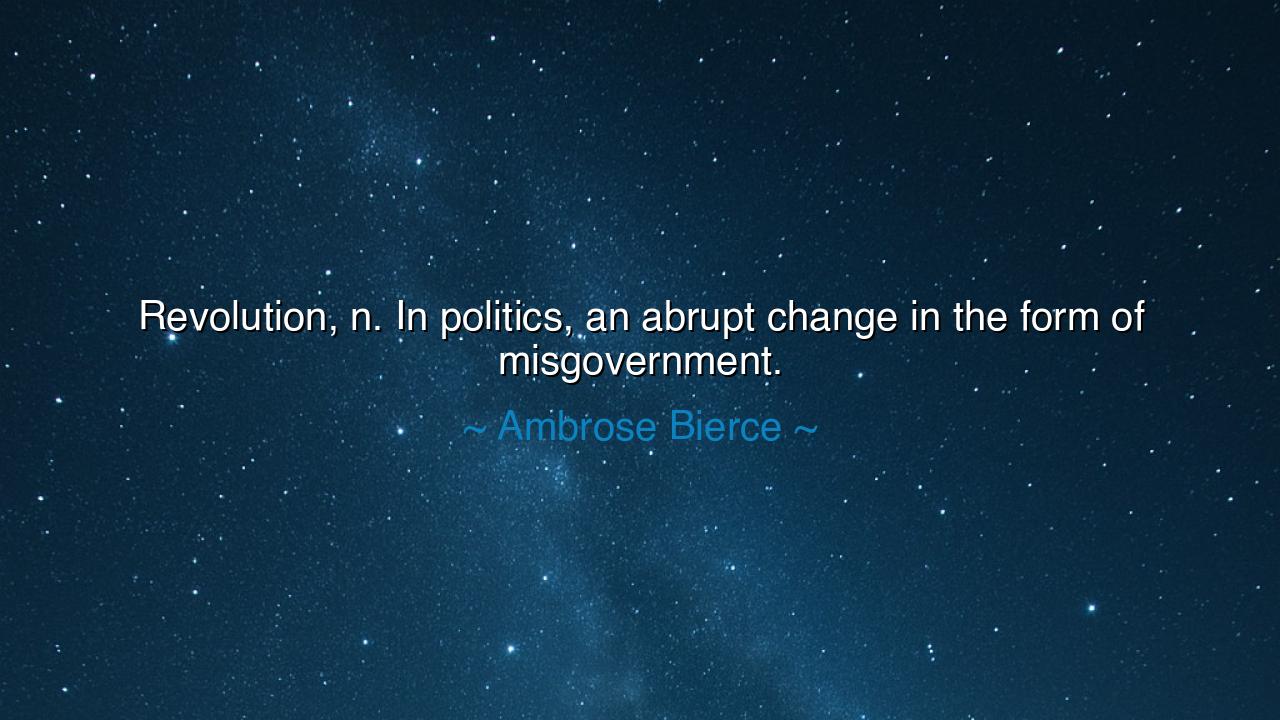
Revolution, n. In politics, an abrupt change in the form of






Revolution, the word itself, brings with it the weight of the ages, a burning desire to cast off the chains of oppression, to rise from the ashes of tyranny and claim one's right to live free. Yet, hear this, young ones: in the wisdom of Ambrose Bierce, we are reminded that revolution is not always the noble act of emancipation we dream it to be. No, Bierce speaks of it as the changing of one form of misgovernment for another, an abrupt shift from one tyranny to the next, as though the flames of freedom are but a flickering spark to be doused by the winds of new rulers.
Look to the tale of the French Revolution: the masses, with the blood of kings upon their hands, rose against the shackles of monarchy, imagining that the dawn of a new era was upon them. But what did they find? A revolution that did little more than exchange one despot for another. The promise of liberty soon drowned in the blood of innocence, as the Reign of Terror unfolded, leaving behind the same darkness they had once sought to escape. In their zeal for change, they did not find freedom, but merely a new form of misgovernment.
The truth, my children, lies not in the grand speeches of the rebels nor the cries of the oppressed. It is found in the quiet realities of what follows when the dust settles after the battle. Revolutions, in their most painful truth, are but the flipping of a coin—a coin that may land on its edge, neither heads nor tails, leaving the world forever in turmoil. Ambrose Bierce, in his sharp and biting way, warns us that the pursuit of freedom through force may only create a new, more insidious prison.
History, though cruel and unforgiving, is the greatest teacher. The mighty Russian Revolution—a struggle that promised the end of the czarist tyranny, the birth of a just, fair society. But was it not the Bolshevik Revolution that led to the rise of a far greater beast? The shadow of Stalin, the purges, the oppression of millions—an even darker era than that which had preceded it. The promises of equality and freedom had dissolved into the cold air, leaving the people as captive as they had been before.
Yet, the wisdom of Bierce does not call for despair, nor does it mean we abandon the cry for justice. It is a lesson, a reminder that change, while necessary, must be sought with eyes wide open. The battle for a just world is not won by the sword alone, for those who rise with revolution may find themselves no better than those they sought to overthrow. It is in the hearts of the people, in the sacrifice for common good, that true change is wrought—not in the fire of war, but in the wisdom of peaceful hearts and minds.
So, remember this, young souls: when the winds of revolution begin to stir, ask yourselves, "What shall follow?" Will it be the dawn of a new day, or the return of the same shadows under a new mask? Ambrose Bierce has shown us the danger of seeking change for the sake of change alone. In our hearts, let us seek not just the fall of one tyranny, but the rise of a world built upon wisdom, justice, and the true freedom of all.






MAMai Anh
Ambrose Bierce’s definition seems to suggest that revolutions are a reaction to failure but ultimately fail to offer real solutions. How much of this pessimism about political revolutions is rooted in historical experience? If revolutions often lead to more misgovernment, what alternative methods should societies look to for achieving true and lasting change? Can we break the cycle, or are revolutions inherently flawed?
NTnguyen tang
This cynical view of revolution challenges the common notion of revolution as a force for progress. If revolutions only change the 'form of misgovernment,' does that mean that no political system is immune to failure? What would it take for a revolution to actually solve the root causes of societal problems rather than just shifting power around? Is revolution just a cyclical process of disillusionment?
SMChao san may
Bierce’s quote gives a bleak view of revolutions, focusing on the idea that political change can simply lead to another form of mismanagement. It makes me wonder: do revolutions ever truly succeed in breaking the cycle of bad governance, or are they doomed to replace one corrupt system with another? What does this say about our faith in revolutionary movements and the hope for lasting political transformation?
DPHoang Dinh phuoc
Bierce's definition of revolution feels disillusioned, as though he’s implying that revolutions often end up repeating the same mistakes. How much truth is there to the idea that revolutions, though initially sparked by the desire for change, ultimately just shift power without solving the underlying problems? Could a revolution truly lead to genuine progress, or are we just trading one form of misgovernment for another?
L7Kim Thuy Linh 7A4
Ambrose Bierce's definition of revolution is strikingly cynical. He describes it as merely an 'abrupt change in the form of misgovernment,' which makes me question whether revolutions ever truly bring about positive change, or if they simply replace one flawed system with another. Is revolution, in essence, just a reaction to mismanagement, or can it be a means to create a fairer and more just society?